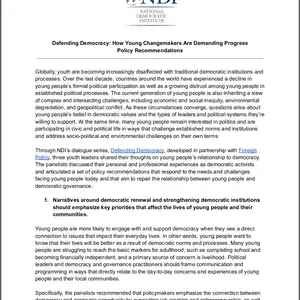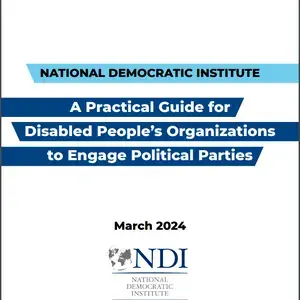Despite constitutional provisions calling for local elections to occur every five years, none have occurred in Malawi since 2000. In the absence of elected local representation, many Malawian citizens feel powerless to improve the quality of their lives, a focus group research study has found. Despite this frustration, Malawians still strongly embrace democratic ideals and democracy’s ability to empower citizens to participate in their own governance.
Far from being disillusioned, many focus group participants say they are likely to vote in 2014 elections, which are slated to include presidential, legislative and local elections for the first time in the country’s history. The study, conducted by NDI in partnership with Malawi’s Catholic Commission for Justice and Peace from Nov. 15-25, 2011, incorporated participant responses from 34 focus group discussions held across 16 districts in Malawi. A total of 427 Malawi citizens participated in the study. Despite the political shifts that have occurred since 2011, particularly the April 2012 death of President Bingu Mutharika and the resulting inauguration of President Joyce Banda—the country’s first female president—many of the attitudes highlighted in this focus group report relate to long term issues that still remain to be addressed.
Focus group participants, by and large, identified economic development as the primary responsibility of government toward its citizens. They identified issues like the lack of available information about current and planned government projects as well as the perception that development has been politicized. At the local level, participants rated the performance of the government as poor, because officials are inaccessible and do not demonstrate the desire to correct major problems in constituent services and infrastructure. Participants were most concerned about the state of the education, health, agriculture and security sectors. Additionally, the study found that Malawians view corruption as pervasive and they have little confidence in the ability of any institution, including the Anti-Corruption Bureau and the police, to address it in a neutral or honest way. The study also solicited Malawians’ perceptions of the July 2011 protests against the Malawi government, during which at least 18 people across the country were killed after police used force to disperse the protests. Focus group participants identified fuel shortages and a failing economy as the most proximate causes, but many cited bad and unresponsive governance as underlying factors.
To address these issues, citizens strongly supported the reinstatement of local elections, so that ward councilors could again serve as the voice of the people. In 2005, after the terms of ward councilors elected in 2000 expired, Malawians lost their most immediate connection to government, with whom they had felt confident and comfortable expressing their views. Participants repeatedly stated that if they regained the opportunity to elect ward councilors, the resulting increase in accountability would reinvigorate development in their communities. Until local elections are held to address citizen’s concerns about local governance, participants say that officials need to increase their outreach to citizens by establishing a clear channel of communication,, visiting communities to observe problems and soliciting citizen feedback. Above all, the report makes clear that despite some disillusionment with voting and politics, Malawians are seeking to more actively participate in their own development and are confident that if included in that process, positive change is possible.
The public opinion study was researched and written by Traci Cook, senior advisor and regional director for focus group research at NDI, and Chris Chisoni, national secretary for CCJP-Malawi.




